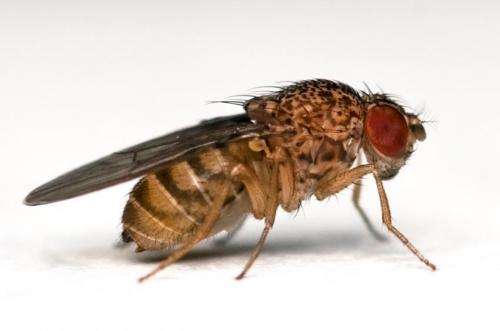Genes responsible for increased activity during the summer

The warm temperature on a summer's day is often a time for relaxing, but researchers from the University of Leicester have suggested that a 'thermosensory' gene could be responsible for changes in behaviour in different climates.
The researchers from the University of Leicester's Department of Genetics have explored how the biological clock can be affected by the environment by examining the fruitfly Drosophila melanogaster, which shows 24 hour biological cycles and is used as a model organism for studies into human rhythms.
Like many humans, the fly has a 'siesta' on a hot afternoon, but only under artificial laboratory conditions - flies do the opposite when in the wild and show a large afternoon locomotor response under naturally cycling summer temperatures.
The hyperactivity of the fly in the wild is controlled by a gene called 'TrpA1', which acts as a thermosensor and causes an environmentally-induced change in behaviour.
Professor Bambos Kyriacou from the University of Leicester's Department of Genetics explained: "The 'TrpA1' gene is reported to be expressed in the part of the brain that houses the fly's biological clock, but when we eliminated expression from these clock cells, the afternoon hyperactivity remained intact.
"Only when we removed 'TrpA1' expression from other neurons did we lose the afternoon component, thereby mapping the behaviour to the activity of a subset of cells."
Circadian 24 hour rhythms percolate through almost every aspect of the behaviour and physiology of terrestrial organisms, including humans.
When the human clock becomes desynchronised from its normal light-dark environment, as in shift workers, a large number of health problems arise, including obesity, cardiovascular dysfunction and even some forms of cancer.
Professor Kyriacou added: "Based on our findings, we have found that investigating animals in their natural environments rather than in labs helps us to better understand how genes control behaviour and can help us to avoid making erroneous conclusions based only on artificial laboratory situations - of course this means that some of our well-established, decades-old interpretations about how the biological clock works could be in need of significant revision."
More information: Drosophila circadian rhythms in seminatural environments: Summer afternoon component is not an artifact and requires TrpA1 channels, Proceedings of the National Academy of Sciences, 2015. www.pnas.org/cgi/doi/10.1073/pnas.1506093112
Journal information: Proceedings of the National Academy of Sciences
Provided by University of Leicester



















